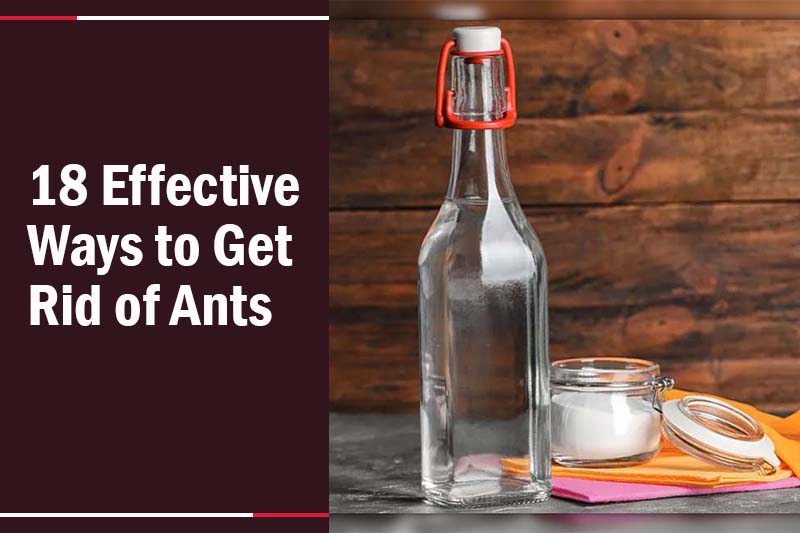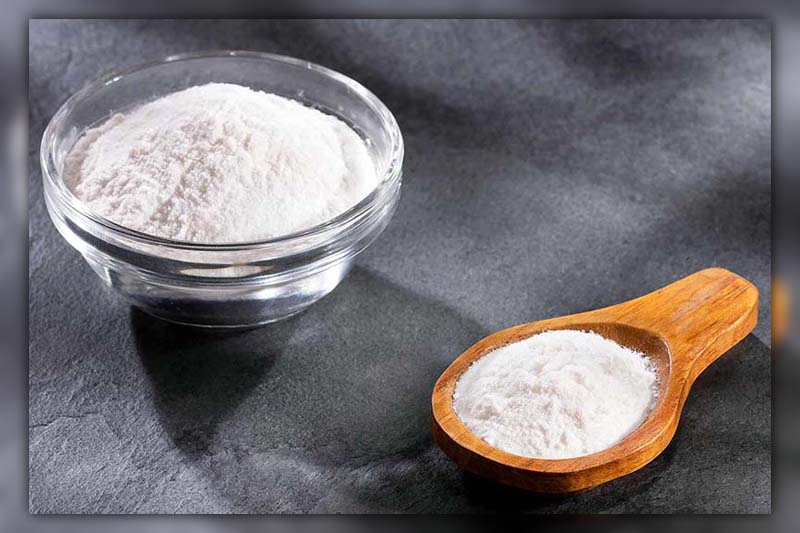Are you tired of sharing your home with uninvited, six-legged guests? Do you find yourself constantly battling armies of tiny intruders in search of food? If the mere thought of ants marching through your kitchen sends shivers down your spine, you’re not alone.
Ant infestations can be a frustrating and persistent problem for many homeowners. But fear not, for in this blog, we’re diving deep into the world of ant control. We’ll explore a plethora of methods to help you get rid of ants once and for all.

18 Effective Ways to Get Rid of Ants
Chalk
You’ve probably heard the advice that ants won’t cross a chalk line to enter your home. But is this claim credible?
Chalk powders have components that can disrupt the pheromones (scent markers used for communication) of ants. Thus, when you create a chalk line or sprinkle chalk powder around areas infested with ants, they struggle to find their way in and are deterred from entering.
White vinegar
White vinegar provides a safe and natural remedy to deter ants. Similar to chalk, vinegar disrupts ants’ pheromones and impairs their sense of smell.
Simply spray a diluted vinegar solution on an active ant colony or the affected area. This severs their connection to scent trails, causing the ants to wander aimlessly.
For effective ant repellent, concentrate on applying the diluted vinegar to sites where ants commonly congregate, like doors and windows. Given the volatile nature of diluted vinegar, daily spraying is advisable to maintain an efficient ant deterrent.
Lemon essential oil
For those averse to vinegar’s scent, citrus and lemon fragrances offer an equally effective alternative. Combine a few tablespoons of lemon juice with water, pour the mixture into a spray bottle, and apply it to ant-prone areas.
Citrus and orange scents work similarly by disrupting ant scent trails, causing them to scatter. Additionally, to maintain a deterrent effect, slice lemons in half and rub them on areas you want to protect from ant intrusion.
Black pepper
The pungent scent of black pepper disrupts their food trails and communication. Sprinkle black pepper along the ants’ path, and you’ll witness their disarray. For a more comprehensive approach, distribute black pepper around their nests to scatter the entire colony.
Mint
The aroma of peppermint disrupts ants’ communication and recognition of pheromones, causing confusion. Simply dilute 10 drops of peppermint oil in 200ml of water and spray it on areas frequented by ants, like window sills and door frames. Planting peppermint around your home can also deter ants and other pests while filling your space with a fresh minty scent.
Corn Flour
To manage ants effectively, consider using cornstarch. While ants can consume cornstarch as a food source, they cannot digest it, ultimately leading to their demise. Though it may not provide immediate results, cornstarch is an economical and eco-friendly option for long-term ant control, ensuring safety within your home.
Garlic
Garlic, a common kitchen spice, can effectively deter ants. Simply peel a few cloves of fresh garlic and position them near ant-prone areas. The garlic’s scent will discourage ants, maintaining a pest-free home. Replace dried-out garlic cloves with fresh ones for long-term ant repellent effects.
Dish washing liquid
Create a solution by mixing 1 part dishwashing liquid with 2 parts water in a spray bottle. Shake well to ensure thorough dissolution, then spray this mixture on the ants. After the ants suffocate, wipe them away with a damp cloth and store the spray for future use. This method can also be used to eliminate cockroaches.
Kerosene
Apply a kerosene-soaked rag to the corners, ant nests, and along the ant trails to deter their presence.
Chalk powder
Sprinkling a small amount of powder on ants or along their path can effectively repel them. Chalk powder disrupts their ability to smell and communicate, causing them to wander aimlessly and preventing them from entering your space.
Baking soda powder
To deter ants, sprinkle baking soda powder in areas where they are present or along their pathways. Alternatively, create a mixture of equal parts baking soda, sugar, and a small amount of dry yeast. The ants will be attracted to the sugar, consume the baking soda, and experience bloating and death.
Tape
You can use regular double-sided tape to trap ants. Create a barrier around items or food you want to protect from ants. If ants attempt to cross the tape, they’ll get stuck. Just replace the tape when needed; it’s a simple solution.
Cinnamon
Cinnamon essential oil, when applied around doors, windows, and floors, can repel ants while leaving your home smelling pleasant. Cinnamon powder is also effective due to its scent, which irritates ants and encourages them to leave.
Coffee
Coffee contains substances that cause ants to expand and die when consumed. To effectively control ants, you can use coffee grounds or coffee water by pouring them into ant nests or areas where ants are present. This is a quick and efficient method for ant control.
Salt
While salt may not directly kill ants, it is highly effective at repelling them. A useful tip is to sprinkle salt along windowsills, doorways, or any areas where ants enter to prevent their access.
Orange peel
Orange peel is as effective at deterring ants as orange juice and essential oils. Blend orange peel with warm water, create a puree, and apply it to doorways or areas you want to keep ants away from.
Wheat Flour
Sprinkle flour along the ants’ path, around your pantry, or where they may attack. The flour will obstruct their movement, deterring them from advancing further.
Water
This traditional method helps prevent and manage ants in the house. To avoid ants crawling into food cabinets and dining tables, place table legs in plastic containers or pots filled with water. Ants that enter will either get stuck or drown.
If nothing works
Bait traps
Enclosed bait traps with pesticides might be a preferred choice for some individuals over sprays. These traps function by luring ants, which consume the bait and transport it back to their nests, effectively eliminating other ants.
Certain bait traps contain boric acid or borax, while others include hydramethylnon, a chemical compound hazardous to children, pets, and crops like tomato plants.
You can acquire ant traps at numerous hardware and gardening outlets, as well as online. If you’re concerned about toxins, it’s advisable to examine the ingredients before making a purchase.
Commercial repellents
Additionally, there are non-toxic commercial repellent sprays available for ant control.
Raid is a chemical spray known for its high effectiveness against ants. It has a long-lasting impact but does contain imiprothrin and cypermethrin, two chemical compounds that should not be inhaled or ingested.
Exterminators
If you’ve exhausted all other options, enlisting the services of an exterminator may be necessary. Seek out one who prioritizes the use of minimally toxic products. Inform them about any specific concerns you may have, like the presence of children, pets, or respiratory health conditions.
Certain professional exterminators may advertise their services as green, organic, or eco-friendly. If you’re worried about chemical usage, inquire about the substances they typically employ in ant treatments before making your decision to hire them.
Conclusion
Armed with the techniques and insights from this blog, you now have the power to get rid of ants and reclaim your space. From simple household remedies to more specialized approaches, you’ve learned how to fend off these persistent pests.
But remember, ant control is an ongoing process, and staying informed is key. Pestweek offers a treasure trove of information on pest management, so don’t stop here. Explore our other blogs to fortify your defenses and ensure your home remains an ant-free sanctuary.

Calina Mabel has over 15 years of experience in the field of journalism and communications. Currently, Calina Mabel is the Content Writer for categories such as Cockroach, Ants, Bed Bugs, Mosquito, Rodent, Termite, and Flies on Pestweek.com. She aims to build content for these categories with a focus on providing valuable and accessible information to readers, in order to create the world’s largest knowledge community about Pests.
All content written by Calina Mabel has been reviewed by Emily Carter.





